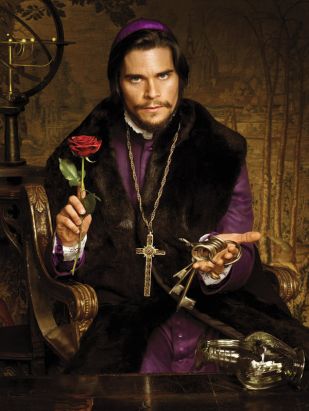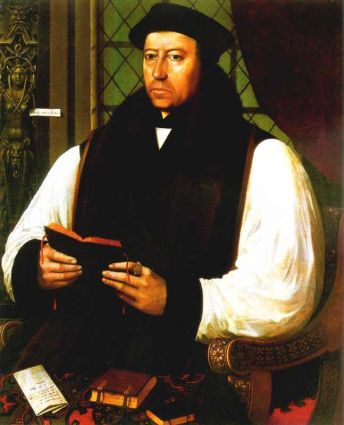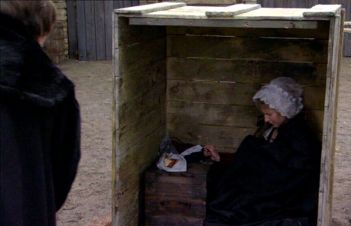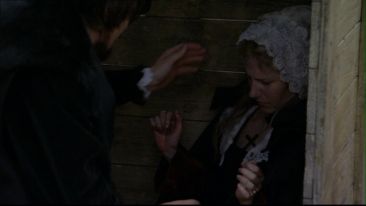Thomas Cranmer
Jump to navigation
Jump to search
Thomas Cranmer as played by Hans Matheson
| | ||||
| Born July 2nd, 1489 - executed March 21st, 1556 by the order of Queen Mary I Character's backstory: Cranmer was born in Nottinghamshire, began studying at Cambridge in 1503, and married upon graduating. When his wife died within a year, however, he returned to Cambridge and was ordained a priest. In 1520 he began meeting with other Cambridge scholars whom Lutheran winds blowing across the North Sea informed and invigorated. "Little Germany", as the group was called, had within it many who would subsequently become leaders in the English Reformation -- and pay dearly for it. For two years King Henry VIII had wanted to divorce Queen Katherine of Aragon on account of her "failure" to provide him with a male heir. Cranmer was consulted. He concluded that scripture, the church fathers, and church councils concurred that Henry was unlawfully married. (Katherine was prievouisly married to Henry's brother, Prince Arthur.) By January, 1533, Henry was desperate for a divorce, if only because the woman he wanted to marry next, Anne Boleyn, was already pregnant. Since the Archbishop had died, Henry appointed Cranmer, assuming Cranmer to be a supporter. Cranmer pronounced Henry's marriage to Catherine void and that to Anne (they had meanwhile been married secretly) valid. Like Cromwell, Cranmer benefited directly from the fall of Queen Katherine of Aragon and the Imperial alliance and the rise of Anne Boleyn and her Norfolk relations. Henry's midlife crisis provided fertile ground for ambitious men. Cranmer and Cromwell liked one another and became friends, though Cranmer was careful to distance himself once Cromwell's ruin was assured. Gentility: Lesser Gentry Position: Archdeacon of Taunton, First Protestant Archbishop of Canterbury Personality type: His native brilliance and his unrelenting diligence saw him acclaimed a theologian of immense learning. He was deeply religious but not psychologically resilient. Signature look: clerical robes Endearing trait(s): although considered to be somewhat of a ditherer, he was a heroic defender of the reformed Christian faith. He helped translate and reform the faith and worship of the English speaking world, recalling it to a simpler more direct proclamation of Christ and the Gospel. Annoying trait(s): concerned almost entirely with his own self-interest and self-preservation; is willing to break with principles or betray friends to stay alive or in power. Click EasyEdit to update this page! (Don't see the EasyEdit button above? <a href="../#signin" target="_self">Sign in</a> or <a href="../accountnew" target="_self">Sign up</a>.) |
| |||
CHARACTER CONNECTIONSFamily members: Children: Anne Cranmer *1527 Thomas Cranmer Jr. *1538 Margaret Cranmer *1553 Marriage(s): 1st wife - Joan 2nd wife - Margaret Osiander*, the niece of a Lutheran reformer, Andreas Osiander *NB. In his book "Thomas Cranmer: A Life" Historian Diarmaid MacCulloch raises, only to dismiss, the rumour that Cranmer's wife was kept in a box. However he does say that Margaret, the second Mrs. Cranmer, must have lived in England so secretly that even her husband's most bitter opponents never learned of her existence. Thus perhaps the box was used as symbolic of that fact. | Friends: Thomas Cromwell, Earl of Essex Sir Thomas Boleyn, Earl of Wiltshire George Boleyn Anne Boleyn Enemies: The Catholic faction spearheaded by Princess Mary Tudor who finally had him executed LINKS:
|
UNFORGETTABLE CHARACTER QUOTES
| |
DEFINING EPISODES | MEMORABLE SCENES
|
PHOTOS
 |  |
 |  |
<embed allowfullscreen="true" height="224" src="http://widget.wetpaintserv.us/wiki/thetudorswiki/widget/youtubevideo/082a3cbf36a4122d9a199fcc53ccf123d2d5651e" type="application/x-shockwave-flash" width="372" wmode="transparent"/> | <embed allowfullscreen="true" height="225" src="http://widget.wetpaintserv.us/wiki/thetudorswiki/widget/youtubevideo/4073d87aab1f3d5ce51a72f51a0666d960037f3c" type="application/x-shockwave-flash" width="372" wmode="transparent"/> |
